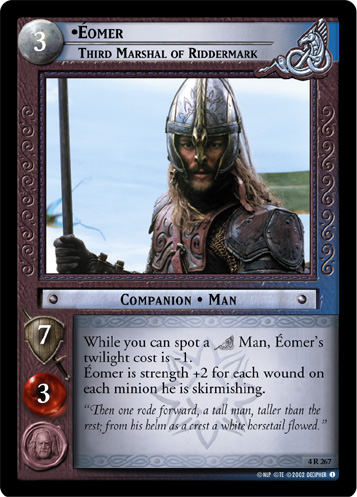The Two Towers
Back to Main Page |
Battle of Helm's Deep |
| The Two Towers | |
|---|---|
| ID | 4 |
| Name | The Two Towers |
| Creator | Decipher |
| Release Date | 2002-11-06 |
| Is Official | yes |
| Platforms | Paper • LotR-O • GEMP • mLOTRO • Tabletop Simulator • Lackey • gccg |
| Notes | |
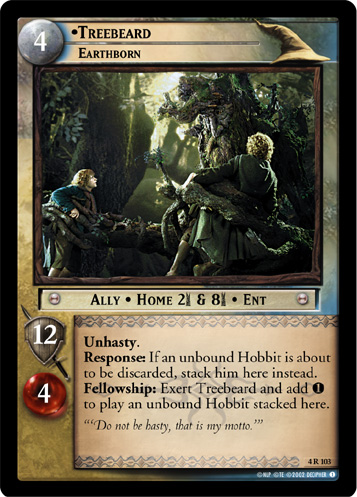
 interacted with the new Bouncing Hobbits archetype.
interacted with the new Bouncing Hobbits archetype.The Two Towers (or TTT) is the second base set of the Lord of the Rings Trading Card Game, the first set in Towers Block, and the fourth set overall. It was released on November 6, 2002 (one month before the movie of the same name). The set contained 365 cards (121 commons, 121 uncommons 121 rares, and 2 premium cards that only appeared in starter decks), all of which could appear in foil versions. Twelve rares, one common, and one premium card from the set had Tengwar versions produced.
The Two Towers introduced the Ents, the Riders of Rohan, Dunlendings, Southrons, and Easterlings, as well as a new site path. Overall, the set had little to no power creep, and was well-produced, making it easier to find sealed product than the Realms of the Elf-lords set that came immediately before it.
Themes and Mechanics[edit]
Like The Fellowship of the Ring before it, New Line disallowed certain concepts from being represented on cards which were considered "spoilers" for the film. The most famous of these was Gollum, who wouldn't premier until the next set of Battle of Helm's Deep.
Rumor has it that Decipher originally tinkered with producing a brand new game rather than continue to extend the mechanics of the TCG, which which were tied closely to the events and structure of The Fellowship of the Ring. This would have been similar to what they did for Star Wars Episode 1, where its content was kept entirely within the Young Jedi TCG instead of the SWCCG (at first, anyway). Whether or not those rumors have any truth to them, the TTT set struggled to implement mechanics which represented the plot of the film and book as well as FOTR had done before it.
The most impactful new mechanic involves the split Ring-bound and Unbound labels for companions, which was an attempt to represent the story split between Frodo in Mordor and everyone else in Rohan. Ring-bound companions (Ithilien Rangers, Frodo, Sam, and later Sméagol) were part of Frodo's storyline, while unbound companions were off fighting in Rohan. Raider cards would target and gain bonuses from fighting Ring-bound companions, while
Isengard and
Dunland cards would target unbound companions.
This mechanic endured, if only because having a shorthand of "unbound" instead of "(except the Ring-bearer)" was convenient for game design. However, even with the number of culture-level designs around targeting specific subsets of individuals, you had the issue of a Rohan fellowship dragging Frodo with them as their Ring-bearer, or a Ring-bound Ranger fellowship trekking through Rohan, which remained thematic issues that made TTT more ill-fitted to the game mechanics thematically than FOTR was.
Also related to the Ring-bound/unbound split was the treatment of the site path--the Towers Block site path in general follows the "unbound" plotline, but various "ring-bound" conditions were included that offered flavor relating to Frodo's journey at specific sites. These cards include:
- Cliffs of Emyn Muil (4R299)
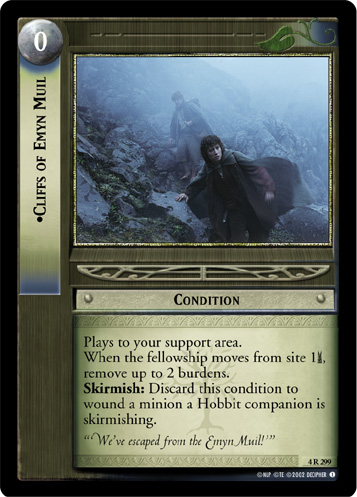
- Eastern Emyn Muil (4R231)
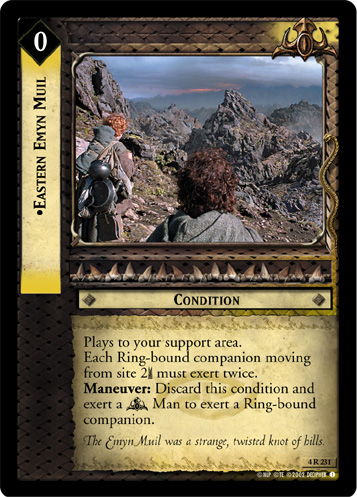
- Forests of Ithilien (4R121)
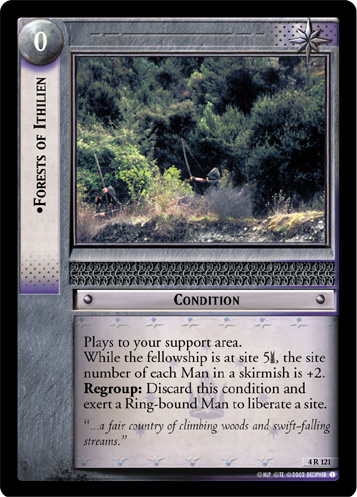
- Henneth Annûn (4R125)
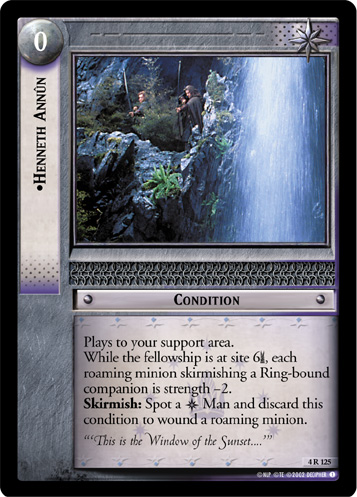
- Ruins of Osgiliath (4R133)
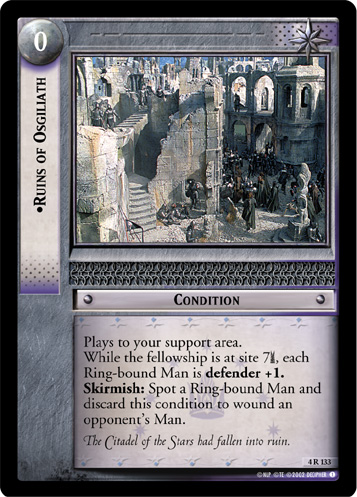
- Ithilien Wilderness (4R237)
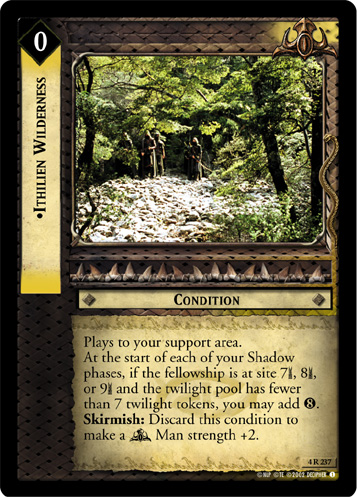
Cultures[edit]
This set introduced three new cultures:
Raider, representing the evil nations of Men sworn to serve Sauron
Dunland, a faction of evil Men influenced by Saruman (and only split off from Raider because Decipher thought that 2 Shadow cultures was too few)
Rohan, the kingdom of horsemen led by Théoden and his heirs Éomer and Éowyn
It was also the first set to contain zero cards from already-established cultures Moria,
Ringwraith, and
Sauron.
New loaded keywords[edit]
The Two Towers introduced four new loaded keywords:
- Ambush, which appeared in the Southron subculture of the
Raider culture
- Ring-bound, which retroactively applied to all versions of Frodo and Sam and was used to create the Ring-bound Ranger subculture in
Gondor
- Unbound, which was never written as a keyword on any companions, but meant "not ring-bound"
- Unhasty, which appeared in this set only on the two versions of Treebeard
New Unloaded Keywords[edit]
The Two Towers introduced seven new unloaded keywords:
- Battleground, on sites
- Easterling, on
Raider minions
- Ent, a new race in the
Gandalf culture
- Machine, on
Isengard possessions
- Southron, on
Raider minions
- Valiant, on
Rohan companions
- Villager, on
Rohan allies
Other mechanics[edit]
The Two Towers introduced several other new mechanics:
- Site Control and liberation
- Culture Tokens
- Subtitles on possessions, artifacts, and conditions (compare Ranger's Sword, Blade of Aragorn (4U132)
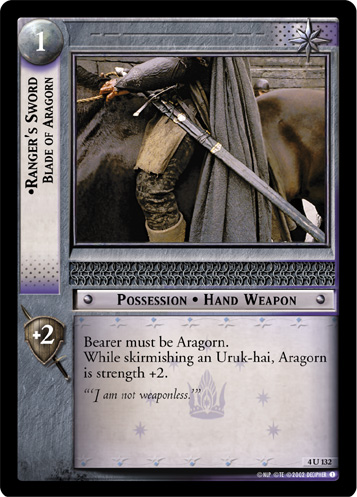 with Ranger’s Sword (1U112)
with Ranger’s Sword (1U112)
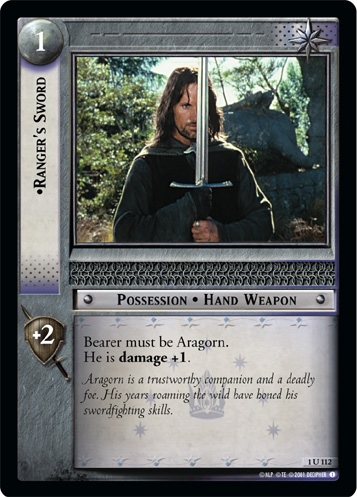
- Allies with multiple home sites, rather than just 1
- Mounts and the pseudo-keyword "Mounted"
- A new site path, which completely replaced the Fellowship Block site path
Starter Decks[edit]
The starter decks in the Two Towers followed the pattern established by The Fellowship of the Ring for base set starters: two decks led by a starter-deck only premium companion (one of which was Aragorn), plus a deluxe starter that did not contain a premium companion, but did include a booster pack and some other gameplay and collectors items.
- Aragorn Starter Deck:
Gondor /
Dunland
- Theoden Starter Deck:
Rohan /
Isengard
- Deluxe Starter Set:
Gandalf /
Shire /
Raider
Cycles[edit]
| Free Peoples Cycles | ||||||
|---|---|---|---|---|---|---|
| Cycle Name | ||||||
| The Three Hunters | Gimli, Lockbearer (4R48)
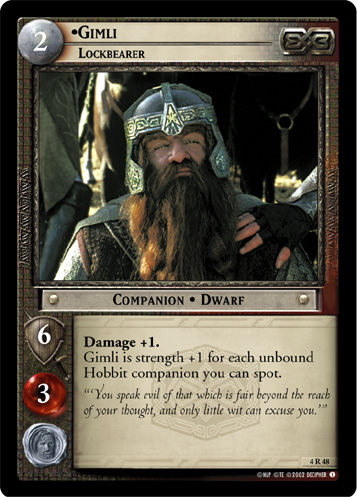
|
Legolas, Dauntless Hunter (4R73)
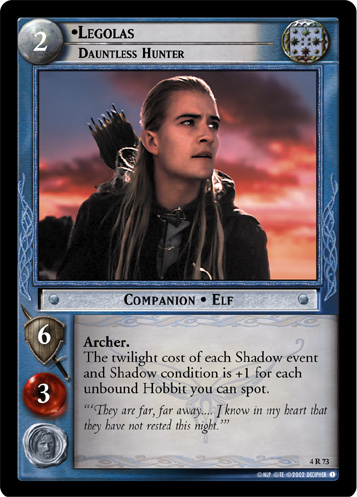
|
N/A | Aragorn, Wingfoot (4P364)
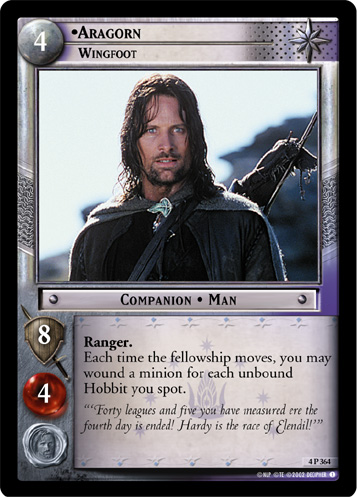
|
N/A | N/A |
| Companions that get stronger for each unbound Hobbit you can spot. | ||||||
| Wins a skirmish conditions | Stout and Strong (4U57)
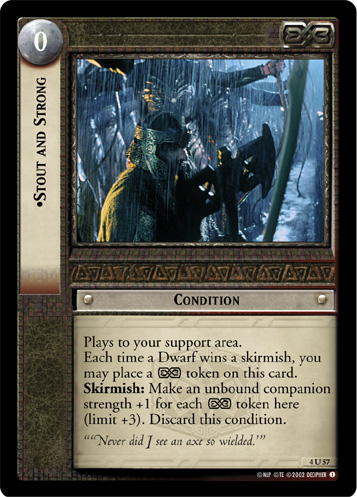
|
Strength of Arms (4U82)
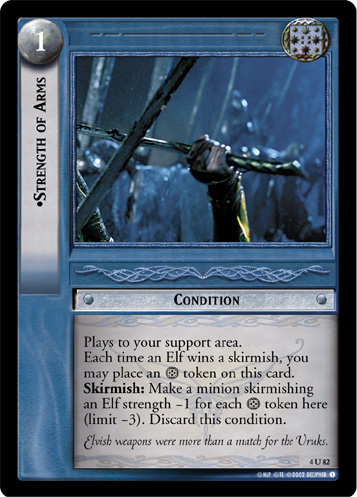
|
Behold the White Rider (4U88)
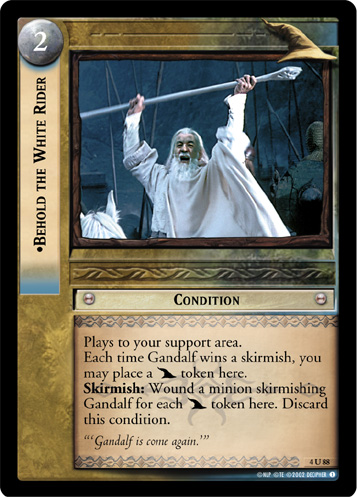
|
Ithilien Trap (4U126)
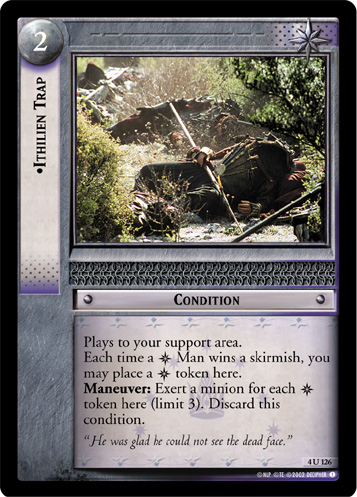
|
Fortress Never Fallen (4U276)
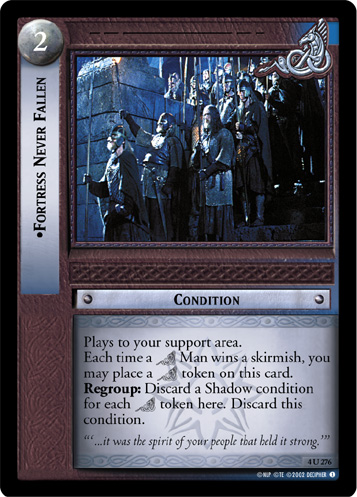
|
Good Work (4U305)
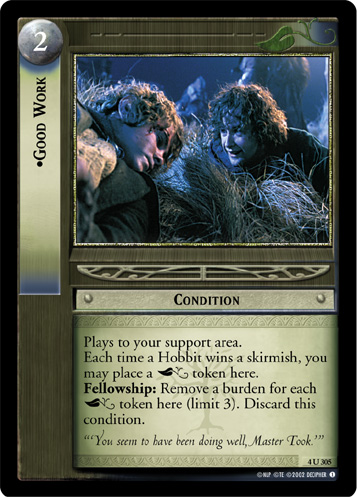
|
| Uncommon support area conditions that gain a culture token every time a companion of the appropriate culture wins a skirmish, then can be discarded for an effect that scales based on the number of tokens on the card. | ||||||
| Shadow Cycles | |||
|---|---|---|---|
| Cycle Name | |||
| Common one-drop minions | Dunlending Ravager (4C15)
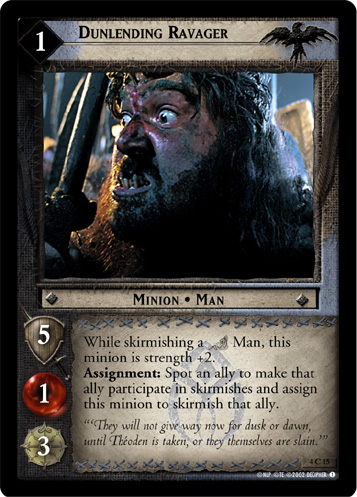
|
Uruk Foot Soldier (4C187)
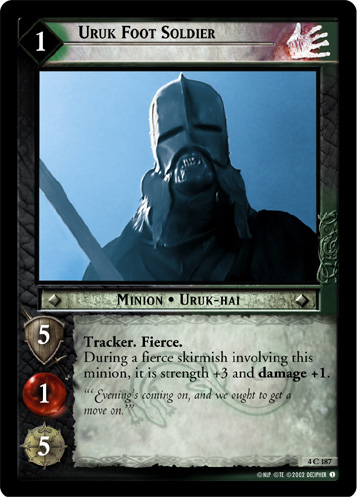
|
Southron Scout (4C252)
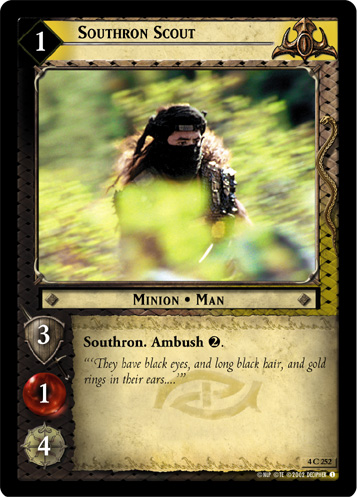
|
| Common minions with a twilight cost of 1. | |||
| Skirmish token conditions | Secret Folk (4U34)
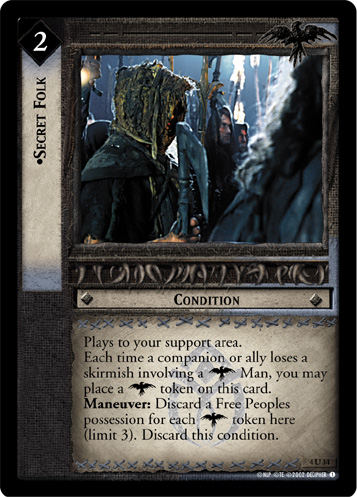
|
Down to the Last Child (4U148)
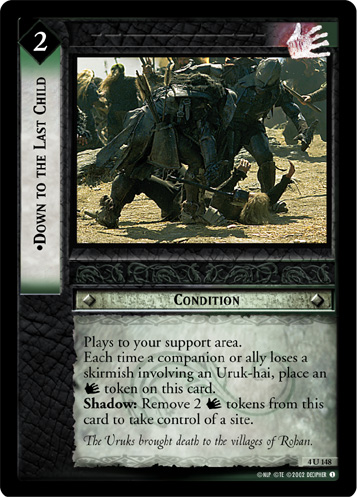
|
Arrow From the South (4U216)
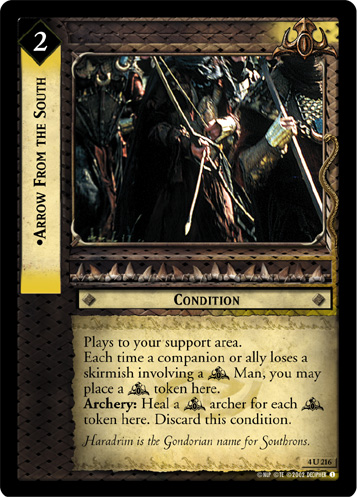
|
| Uncommon support area conditions that gain a culture token every time a minion of the appropriate culture wins a skirmish, then can be discarded for an effect that scales based on the number of tokens on the card. | |||
| "Spot a site you control" conditions | Over the Isen (4U31)
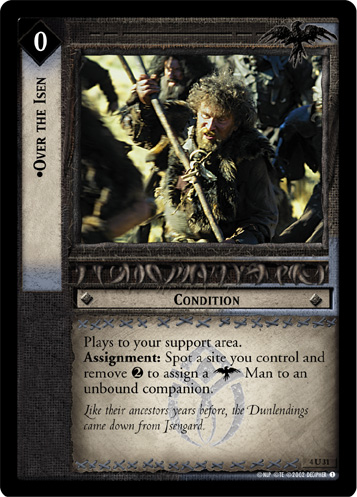
|
Race Across the Mark (4R168)
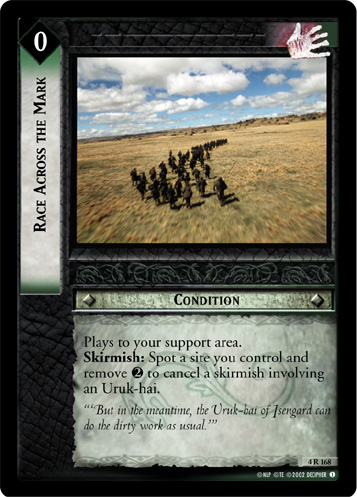
|
Men of Harad (4R238)
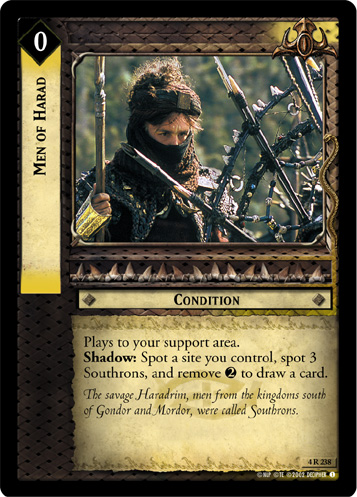
|
| Support area conditions with a repeatable ability that requires you to spot a site you control and remove (2) to use. | |||
Reprinted cards[edit]
- The One Ring, The Ruling Ring (4C2)
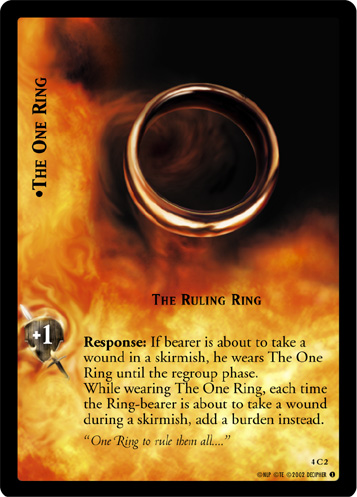 (previously 1C2)
(previously 1C2) - Elven Bow (4U62)
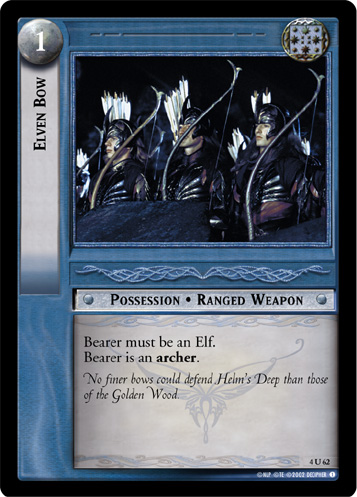 (previously 1C41)
(previously 1C41) - Pathfinder (4C129)
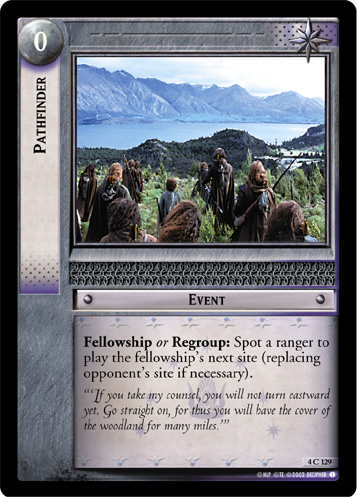 (previously 1C110)
(previously 1C110) - Uruk-hai Raiding Party (4C207)
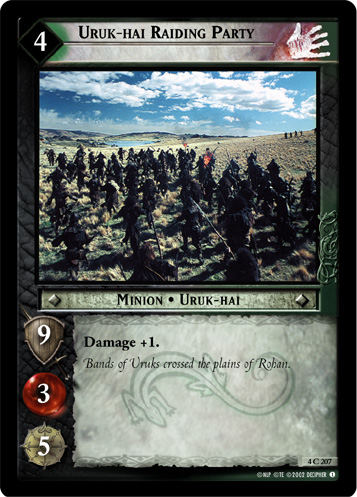 (previously 1C158)
(previously 1C158) - Hobbit Sword (4C306)
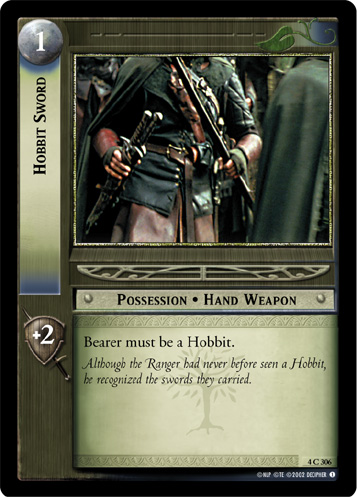 (previously 1C299)
(previously 1C299)
Similar sites[edit]
Because The Two Towers introduced a completely new site path, the set included some sites very similar to sites previously released in Fellowship Block in order to enable the same strategies.
- Eastemnet Downs (4U324)
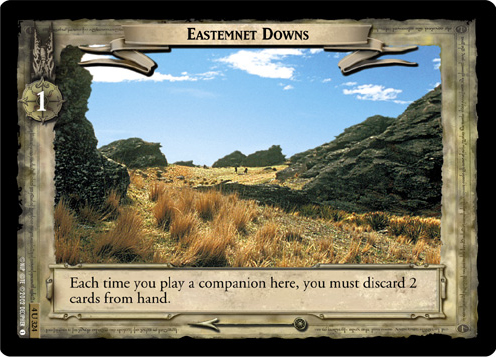 (punishes large fellowships, similar to East Road (1U320)
(punishes large fellowships, similar to East Road (1U320)
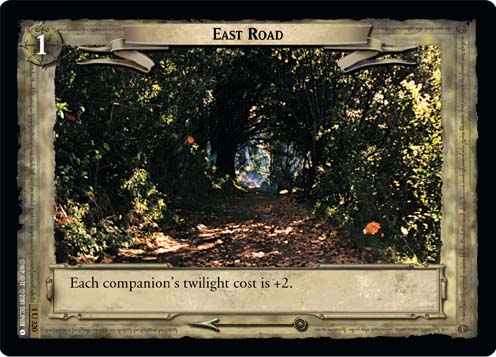 )
) - The Riddermark (4U328)
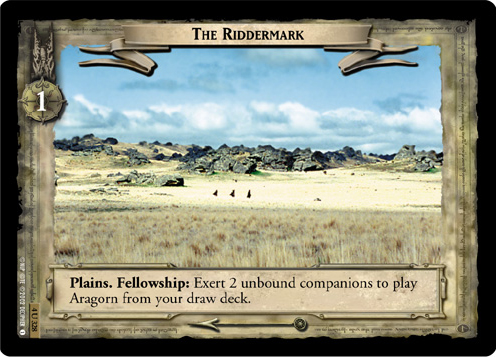 (allows you to tutor Aragorn from your draw deck, similar to The Prancing Pony (1U324)
(allows you to tutor Aragorn from your draw deck, similar to The Prancing Pony (1U324)
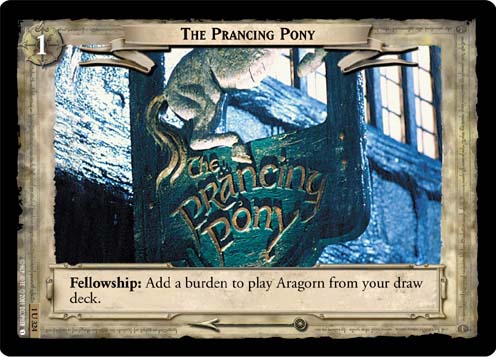 )
) - White Mountains (4U345)
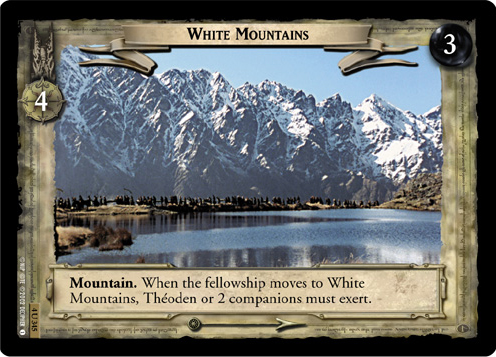 (similar game text to Dwarrowdelf Chamber (1U344)
(similar game text to Dwarrowdelf Chamber (1U344)
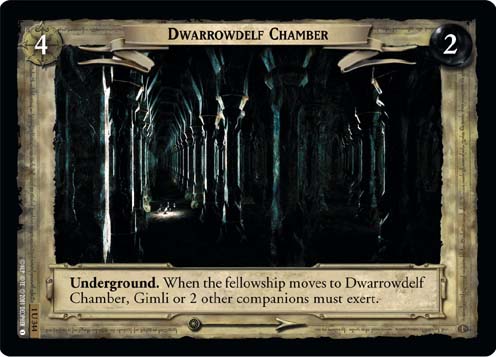 and Moria Lake (1C346)
and Moria Lake (1C346)
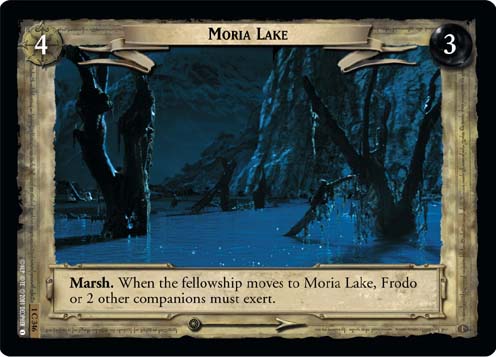 )
) - Hornburg Causeway (4U356)
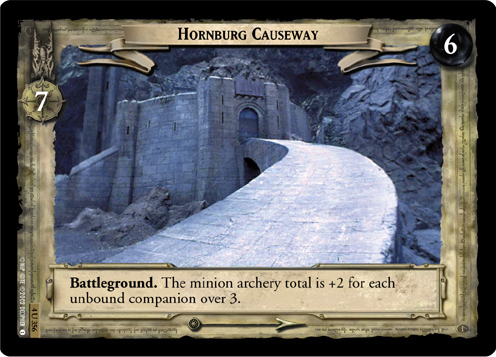 (similar game text to Anduin Banks (1C356)
(similar game text to Anduin Banks (1C356)
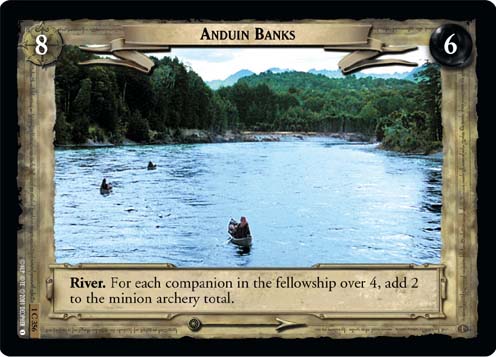 )
) - King's Room (4U357)
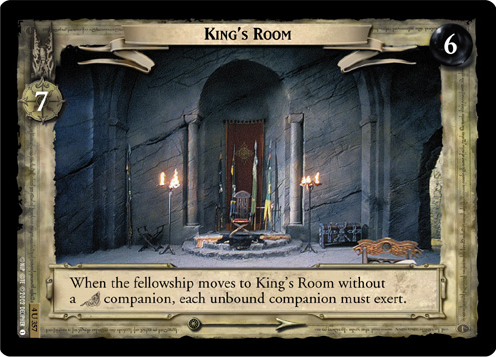 (similar game text to Silverlode Banks (1U355)
(similar game text to Silverlode Banks (1U355)
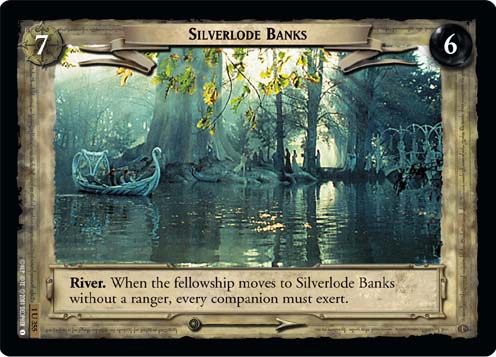 )
)
Notable Cards[edit]
- The One Ring, Answer To All Riddles (4R1)
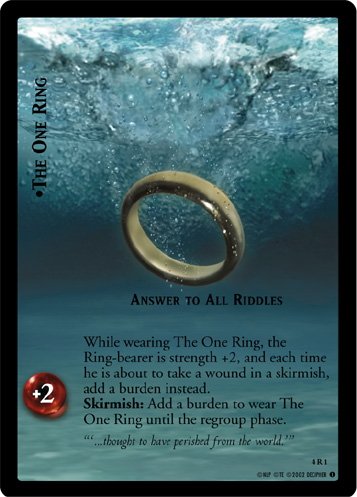
- Saruman, Rabble-rouser (4R33)
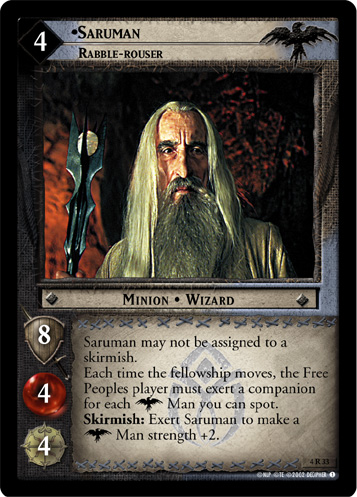
- Legolas, Dauntless Hunter (4R73)

- Faramir, Son of Denethor (4C117)
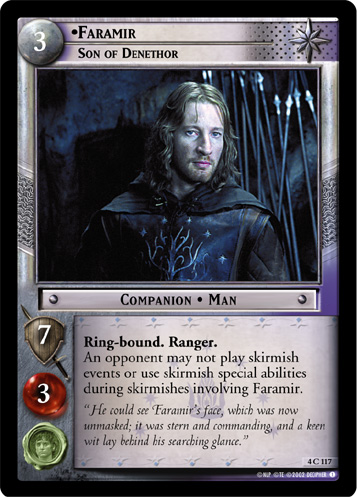
- Gríma, Wormtongue (4R154)
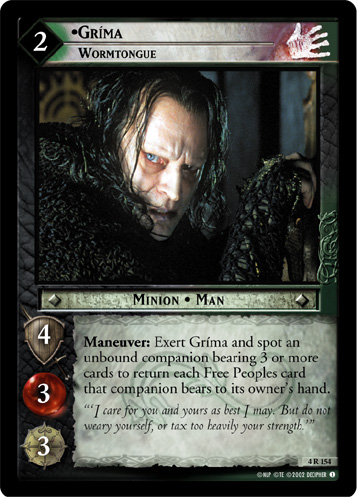
- Éomer, Third Marshal of Riddermark (4R267)
